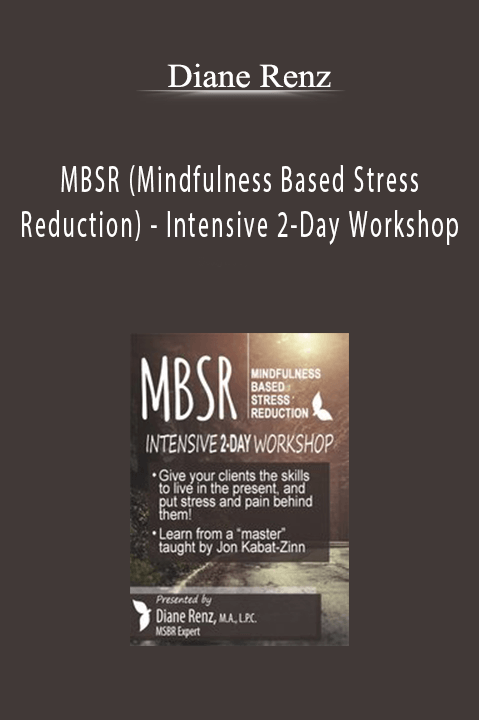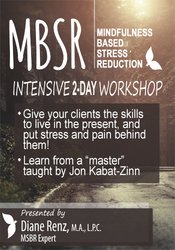MBSR (Mindfulness Based Stress Reduction) – Intensive 2-Day Workshop – Diane Renz
- Give your clients the skills to live in the present, and put stress and pain in new context!
- Learn from an MBSR expert trained by Jon Kabat-Zinn
A note from your speaker
If you are reading this, I know you are interested in healing.
As a clinician, you know that exploring the various treatment modalities to facilitate that healing upholds the rigor of our profession.
For me, it became very clear that over many decades of that same pursuit, that the symptoms presented by my clients could become their ally – if they learned how to relate to them differently.
Whether the problem is stress, anxiety, depression, grief, trauma, or catastrophic illness, that presenting problem is the gateway to healing. It is dependent upon the quality of awareness and relationship applied to the perceived ‘problem’. Hence, my life’s work is creating conducive environments for the health of individuals. Mindfulness, and specifically the original template for mindfulness based interventions, MBSR, is teaching clients how to access their innate ability for healing through a new kind of awareness.
- Present the core beliefs of Mindfulness Based Stress Reduction (MBSR) as they relate to clinical treatment.
- Ascertain the meaning of mindfulness and provide psychoeducation to clients regarding its use for reducing stress and improving mental health.
- Implement various methods of guided meditation utilized to decrease stress and improve symptomology.
- Teach clients how to integrate specific mindfulness interventions into their daily lives to alleviate symptoms and improve level of functioning.
- Consider the use of a “mindful pause” as an intervention to refocus attention and interrupt negative thoughts and ruminations.
- Practice the process of inquiry and evaluate its ability to enhance client insight and reduce stress.
- Articulate the effectiveness of MBSR techniques in treating pain, stress, anxiety and panic in clients.
- Evaluate the use of interpersonal mindfulness in facilitating effective communication and increasing awareness of the client.
- Appraise the applicability of neuroscience research to stress reduction and ascertain its clinical implications.
- Determine specific adaptations of MBSR practices that can be utilized to treat symptoms of anxiety, depression, addiction and trauma.
- Establish MBSR practices that are developmentally appropriate and effective for children and adolescents.
- Articulate the methods by which MBSR can be interfaced with psychotherapy practices to improve clinical outcomes.
Foundational Principles
- The Origin of MBSR
- Goals and Principles
- Populations Served
- Assessment and Orientation
- MBSR Ground Rules
- Teacher Competencies
The Curriculum—Themes
- Class 1-3 Grounding Mindfulness in the Body
- Class 4-5 Stress Reaction versus Response
- Class 6-7 Communication and Interpersonal Mindfulness
- Class 8 Summation and Bringing Mindfulness Home
- All Day Session
Establishing Mindfulness Practices
- Defining Mindfulness
- Introduce Mindfulness Experientially and Verbally
- 7 Essential Attitudes in Establishing Mindfulness
Establishing Intention and Commitment to Practice
- How Intention Determines Outcome
- Language to Guide – Top Down v. Bottom Up
- Reality of the Road to Mindfulness Practice – Overcoming Obstacles
Guidance in Formal Mindfulness Practices
- The Body Scan
- The Sitting Meditation with Awareness of Breath
- Yoga
- Walking Meditation
- Loving-Kindness Meditation
- Practice in Leading a Mindfulness Meditation
Applying Mindfulness to Daily Life
- Creating Home Practices
- Use of Homework
- The S.T.O.P.
- The Three Minute Breathing Space
- Awareness Exercises
Clinical Issues: Working with Difficulties
- The Integrative Functions of MBSR
- Working with Feeling
- Working with Pain and Stress
- Working with Anxiety and Panic
- Application of Neuro-Science Research
Extract the Principles of MBSR for Application with:
- Anxiety/trauma
- Depression
- Addictions
- Mindfulness as Context, Content and Diagnostic
Inter-personal Mindfulness and Communication
- Why Relationship is Number One Stressor
- What is Mindful Communication?
- Aikido as Metaphor in MBSR
- Perceptual Awareness of the Body
- Implicit Bias and the Brain
Limitations of Research and Potential Risks
- Various definitions of mindfulness
- Research validity and reliability
- Client may experience initial increase in symptoms
- Special considerations for severe mental illness
Instant Access Available
Product Content

Get Instant Access MBSR (Mindfulness Based Stress Reduction) – Intensive 2–Day Workshop – Diane Renz at Offimc.click Now!
Sale Page: https://catalog.pesi.com/item/20365/
Delivery Information
- Upon ordering the product, a delivery email with download instructions will be sent immediately to you so that you may download your files. If you log in (or create an account) prior to purchase you will also be able to access your downloads from your account dashboard.
- It is a digital download, so please download the order items and save them to your hard drive. In case the link is broken for any reason, please contact us and we will resend the new download link to you.
- If you don't receive the download link, please don’t worry about that. We will update and notify you as soon as possible from 8:00 AM – 8:00 PM (UTC+8).
- Please Contact Us if there are any further questions or concerns you may have. We are always happy to assist!








11 reviews for Intensive 2–Day Workshop – Diane Renz – MBSR (Mindfulness Based Stress Reduction)
There are no reviews yet.